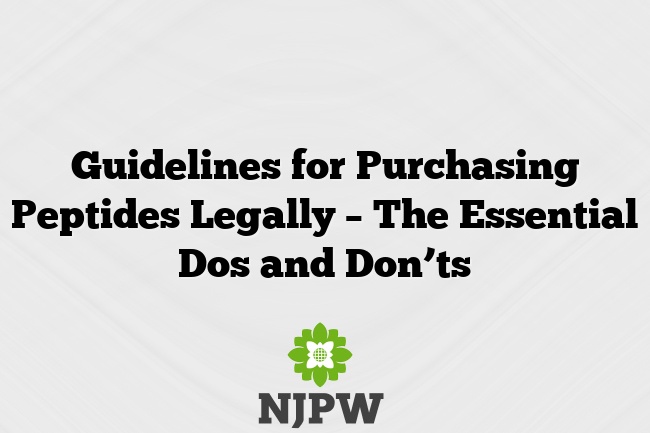Guidelines for Purchasing Peptides Legally – The Essential Dos and Don’ts

Peptides have become a subject of growing interest in the health and wellness community, offering a range of potential benefits for those seeking to optimize their physical and cognitive performance. As a responsible consumer, it’s crucial to understand the legal landscape and best practices for purchasing these compounds. In this comprehensive guide, we’ll explore the essential dos and don’ts of acquiring peptides legally, ensuring you navigate the process with confidence and safety.
| Key Considerations | Importance |
|---|---|
| Peptide Legality | Staying informed about the regulatory landscape and understanding the legal status of peptides in your region is paramount. |
| Supplier Verification | Identifying legitimate peptide suppliers is crucial to ensure the quality, purity, and safety of your products. |
| Proper Handling and Storage | Adhering to the correct peptide storage and handling protocols is essential for maintaining the integrity and potency of your peptide compounds. |
Understanding the fundamentals of peptides is the first step in navigating the world of legal peptide purchasing. Peptides are short chains of amino acids that play vital roles in the body’s physiological processes. They can be derived from natural sources or synthesized in a laboratory setting. The potential benefits of peptides include, but are not limited to, improved muscle growth, enhanced recovery, better sleep, and cognitive enhancement.
Identifying Legitimate Peptide Suppliers
When it comes to purchasing peptides legally, the quality and legitimacy of the supplier are paramount. Reputable peptide vendors will prioritize transparency, quality control, and compliance with all relevant regulations. Look for suppliers that provide detailed information about their manufacturing processes, third-party lab testing, and certifications. Avoid peptide vendors that make exaggerated claims, lack proper licensing, or fail to disclose the source and purity of their products.
The Importance of Purity and Potency
The purity and potency of peptides are crucial factors to consider when purchasing these compounds. Impurities or suboptimal potency can compromise the effectiveness and safety of peptide products. Responsible peptide consumers should seek out suppliers that employ rigorous testing and quality control measures to ensure the highest levels of purity and potency.
Understanding Peptide Legality and Regulations
The legal status of peptides can vary significantly depending on your location and the intended use of the compounds. In the United States, for example, peptides may be regulated as drugs, dietary supplements, or research chemicals, depending on the specific peptide and its intended purpose. It’s essential to familiarize yourself with the regulations in your region and only purchase peptides from suppliers who can demonstrate compliance with all applicable laws and guidelines.
Avoiding Counterfeit and Mislabeled Products
The peptide market is not immune to the presence of counterfeit and mislabeled products. These can pose serious health risks, as they may contain undisclosed ingredients, substandard purity, or even dangerous contaminants. Vigilance is crucial when purchasing peptides online or from unfamiliar sources. Verify the supplier’s reputation, look for third-party lab testing results, and be wary of unusually low prices or claims that seem too good to be true.
Proper Storage and Handling of Peptides
Proper storage and handling of peptides are essential to maintain their integrity and potency. Peptides are generally sensitive to heat, light, and moisture, and improper storage can lead to degradation and loss of effectiveness. Follow the supplier’s recommendations for storage conditions, such as refrigeration or freezing, and handle the peptides with care to avoid contamination or accidental exposure.
Dosage Considerations for Safe Use
Peptide dosage is a critical factor in ensuring safe and effective use. Consult with healthcare professionals, such as physicians or registered dietitians, to determine the appropriate dosage for your specific needs and goals. Adhere to the recommended dosages provided by the supplier and be cautious of any peptide products that suggest excessive or open-ended dosing regimens.
Combining Peptides with Other Supplements
While peptides can be combined with other supplements, it’s essential to exercise caution and consult with healthcare professionals. Some peptides may interact with certain medications or other supplements, potentially leading to adverse effects or diminished efficacy. Carefully research any potential interactions and always prioritize your health and safety when considering supplement combinations.
Consulting with Healthcare Professionals
Engaging with healthcare professionals, such as physicians, registered dietitians, or licensed nutritionists, is highly recommended when purchasing and using peptides. These experts can provide personalized guidance on the appropriate peptides for your specific needs, help you navigate the legal and regulatory landscape, and monitor your progress to ensure the safe and effective use of these compounds.
Responsible Peptide Purchasing Practices
Ultimately, responsible peptide purchasing practices involve a combination of thorough research, diligence, and a commitment to your health and well-being. By following the guidelines outlined in this article, you can confidently purchase peptides legally and safely, unlocking the potential benefits while prioritizing your safety and compliance with all relevant regulations.
Conclusion
Navigating the world of peptides can be complex, but by understanding the essential dos and don’ts, you can make informed decisions and purchase peptides legally and responsibly. Remember to prioritize quality, purity, and safety, and always consult with healthcare professionals to ensure the safe and effective use of these compounds. By embracing a responsible approach, you can unlock the potential benefits of peptides while safeguarding your health and well-being.
Frequently Asked Questions
What are the legal considerations for purchasing peptides?
The legal status of peptides can vary depending on your location and the intended use of the compounds. It’s crucial to familiarize yourself with the regulations in your region and only purchase peptides from suppliers who can demonstrate compliance with all applicable laws and guidelines.
How can I identify a legitimate peptide supplier?
Look for peptide vendors that prioritize transparency, quality control, and compliance with all relevant regulations. Reputable suppliers will provide detailed information about their manufacturing processes, third-party lab testing, and certifications, and they will avoid making exaggerated claims or failing to disclose the source and purity of their products.
What are the key factors to consider when purchasing peptides?
When purchasing peptides, the most important factors to consider are the purity and potency of the products, the legitimacy and reputation of the supplier, and the proper storage and handling of the peptides. It’s also crucial to understand the legal regulations in your region and to consult with healthcare professionals for guidance on safe and effective use.






